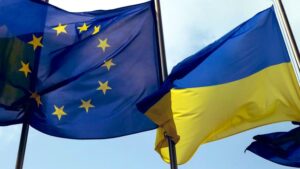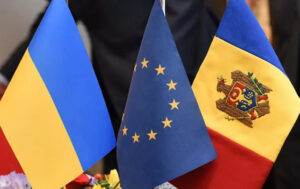
The EU says that the negotiations on Ukraine’s accession to the European Union will be rigorous and demanding, and that it will be up to EU member states to decide whether all the conditions for completion have been met.
“The accession negotiations that we are starting today will be rigorous and demanding. Thanks to your determination and commitment, we are confident in your ability to bring this process to a successful conclusion. We will support you in your efforts, and we look forward to welcoming you as a fully-fledged member of the European Union,” said Hajia Labib, Minister of Foreign Affairs of Belgium, which holds the EU presidency, at the opening of the Intergovernmental Conference in Luxembourg on Tuesday, marking the start of official negotiations on Ukraine’s accession to the EU.
She clarified that it is the EU member states that will decide whether the conditions for completing the negotiations have been met, taking into account changes in EU legislation since the opening of the negotiations and Ukraine’s readiness for membership.
Presenting the approved framework for the negotiations, the Minister said that it is based on “taking into account the experience of past enlargements and ongoing accession negotiations, as well as EU legislation, and properly reflects Ukraine’s advantages and characteristics.” “The negotiations are aimed at ensuring that Ukraine fully adopts EU norms and ensures their full implementation and compliance. The negotiations also include a revised enlargement methodology, which ensures an even greater focus on fundamental reforms in the accession negotiations. Therefore, Ukraine will need to fully adopt and continue to implement reforms in the areas of rule of law and fundamental freedoms, strengthening democratic institutions and public administration reforms, as well as economic criteria,” the Minister elaborated.
In addition, Ukraine will need to pay special attention to judicial reform, the fight against corruption, and the protection and non-discriminatory treatment of persons belonging to national minorities. “To ensure that progress in these areas is irreversible and fully and effectively implemented, progress will be closely monitored by the Commission, which will report regularly to the Council,” Labib said.
According to her, “the progress in the implementation of the fundamental cluster (the cluster on fundamental values) will be crucial throughout the process of these reforms, which will determine the overall pace of the negotiations.” “This will give enough time to create the necessary legislation, institutions, and a solid track record of implementation before the end of the negotiations. The screening reports to be prepared by the Commission will contain substantial recommendations, in particular on the tasks to be addressed in the roadmaps adopted by the Ukrainian authorities,” the minister added.
At the same time, Labib expressed the expectation that Ukraine, as a future member state, will adhere to EU values, “namely, respect for human dignity, freedoms, democracy, equality, the rule of law, the rule of law and respect for human rights, including the rights of individuals to belong to minorities.” “In addition, accession to the EU provides for the timely and effective implementation of all EU legislation or the EU acquis as it existed at the time of accession. In accordance with the revised enlargement methodology, the development of sufficient administrative and judicial capacity, as part of the fundamental cluster, is key to fulfilling all the obligations arising from membership. Good neighborly relations with EU member states and other enlargement partners remain important,” she said.
The minister said that the EU welcomes “Ukraine’s strategic commitment to its EU path and its high coherence with the EU’s common foreign and security policy and its restrictive measures”. “We encourage Ukraine to continue this positive trend towards full coherence, in line with respect for the principles of sovereignty and territorial integrity, including for EU members. Coherence with the EU’s foreign and security policy is a key aspect of the EU integration process and a clear expression of a strategic choice.”
In addition, according to Labib, in parallel to the accession negotiations, the Union and Ukraine will continue their dialogue with civil society and cultural cooperation in order to “bring people closer together and ensure that citizens support the accession process.” “We expect Ukraine to continue to strategically communicate the benefits and commitments of the accession process and EU membership to its public, including by combating disinformation,” she said.

The membership negotiations began on Tuesday, a landmark move aimed in particular at signaling a vote of confidence in Ukraine’s future.
The European Union launched accession negotiations with Ukraine and Moldova on Tuesday, June 25, setting the fragile ex-Soviet states on a long path towards membership that Russia has tried to block. The landmark move is aimed in particular at signaling a vote of confidence in Ukraine’s future as Moscow has momentum on the battlefield almost two and a half years into the Kremlin’s invasion.
Ukraine’s President Volodymyr Zelensky called it a “historic day” ahead of the start of talks between officials from Kyiv and the EU’s 27 member states in Luxembourg. “We will never be derailed from our path to a united Europe and to our common home of all European nations,” the Ukrainian leader wrote on social media.
Ukraine and later its neighbour Moldova lodged their bids to join the EU in the immediate aftermath of Russia’s all-out assault in February 2022. The start of the talks marks just the beginning of a protracted process of reforms strewn with political obstacles that will likely take many years — and may never lead to membership.
Read more Subscribers only European Union approves opening of formal accession negotiations with Ukraine
Standing in the way along that journey will be not just Russia’s efforts at destabilisation but reticence from doubters inside the EU, most notably Hungary. But European Commission chief Ursula von der Leyen called the opening of talks “very good news for the people of Ukraine, Moldova, and the entire European Union. The path ahead will be challenging but full of opportunities,” she wrote on X on Tuesday.
So far, Ukraine – represented at the talks by Deputy Prime Minister Olga Stefanishyna – has won plaudits for kickstarting a raft of reforms on curbing graft and political interference, even as war rages. “Today is a historic day for Ukraine and Moldova, but also for the EU,” said Germany’s Europe minister Anna Luehrmann. “Both countries have made enormous progress in the area of the rule of law, the fight against corruption and freedom of the press.”
Complex process
Russia’s war in Ukraine has reinvigorated a push in the EU to take on new members, after years in which countries particularly in the Western Balkans made little progress on their hopes to join. The EU in December 2023 also granted candidate status to another of Russia’s former Soviet neighbours, Georgia. It likewise approved accession negotiations with Bosnia and has talks ongoing with Serbia, Montenegro, Albania and North Macedonia.
The meetings with Ukraine and Moldova on Tuesday will set off a process of screening of how far laws in the countries already comply with EU standards and how much more work lies ahead. Once that is done the EU then has to begin laying out conditions for negotiations on 35 subjects – from taxation to environmental policy.
It appears unlikely that there will be progress onto the next step in the coming six months, when Hungary – the friendliest country to Russia in the bloc – holds the EU’s rotating presidency. “It’s very difficult to say at what stage Ukraine is,” said Hungary’s Europe minister Janos Boka. “From what I see here as we speak, they are very far from meeting the accession criteria.”
The start of the talks resonates powerfully in Ukraine as it was a desire for closer ties with the EU that sparked protests back in 2014 that eventually spiralled into the full-blown crisis with Russia. The talks also come at a tense time in Moldova after the United States, Britain and Canada warned of a Russian “plot” to influence the country’s presidential elections coming up in October.
Wedged between war-torn Ukraine and EU member Romania, Moldova’s pro-Western authorities frequently accuse the Kremlin of interfering in its internal affairs. President Maia Sandu has accused Moscow – which has troops stationed in a breakaway region of the country – of aiming to destabilise Moldova ahead of the vote. “Our future is within the European family,” Sandu wrote on X. “We are stronger together.”
Le Monde with AFP

The agricultural sector is, without exaggeration, one of the key pillars on which the Ukrainian economy rests, with exports generating 62% of foreign exchange earnings in 2023 alone, said Olga Stefanishyna, Vice Prime Minister for European and Euro-Atlantic Integration of Ukraine.
“The Ukrainian agro-industrial complex has withstood difficult conditions and continues to operate, supporting the economy, ensuring food security not only in Ukraine, the world, but also in Africa, the Middle East, and Southeast Asia,” she said at the presentation of the Strategy for the Development of Agriculture and Rural Areas until 2030 in Kyiv on Friday.
She reminded that a significant part of Ukrainian agricultural products was exported to the European Union, with which Ukraine had a free trade area, in particular due to unprecedented measures taken by the EU, which introduced autonomous trade preferences at the beginning of the war and increased Ukraine’s logistics capabilities through the path of solidarity.
The Deputy Prime Minister emphasized that this decision of the EU was made possible thanks to the experience of implementing the Association Agreement, the development of the Ukrainian agricultural sector under the influence of the implementation of European legislation and the gradual adaptation to the norms of EU production standards since 2014.
“Today we are witnessing a new stage of integration of the Ukrainian agro-industrial complex (…) into the EU internal market. For the first time in its history, Ukraine is proposing not only a strategy for agricultural development, but also a strategy for Ukraine’s membership in the European Union, a strategy that envisages that Ukraine will become part of a large internal market – the most developed, dynamic and competitive one,” Stefanishyna emphasized.
The Deputy Prime Minister expressed confidence that the introduction and implementation of the approaches envisaged in the strategy for the development of the agro-industrial complex will not only lead to the achievement of European standards, but will also increase the productivity of the agricultural sector, promote export growth, create new jobs, stimulate the production of value-added goods, increase competitiveness, and ensure the sustainability and security of the increase in production in Ukraine.
Stefanyshyna added that the Strategy submitted for public consideration contains elements of the commitments under the Ukraine Facility program. The Strategy, in turn, provides for rather targeted but systematic measures to invest in and restore the Ukrainian agricultural sector and restore Ukraine’s economic well-being.
At the same time, the Deputy Prime Minister noted that Ukraine will have a lot of homework ahead of it, as agriculture is one of the most developed areas of regulation in the European Union.
“There are a lot of new obligations waiting for us here, which will lead us to the fact that our agricultural borders will not be limited to 40 million consumers, but will be 500 million consumers – on the one hand. On the other hand, during the negotiation process on membership, which will be led by Ukraine, there will also be an internal reform in the field of agricultural policy, agriculture in the European Union. It was actually launched against the backdrop of the consequences of Russian aggression and against the background of the EU being predictable, prudent and competitive in this area,” the Deputy Prime Minister for European Integration summarized.
She also thanked the Ministry of Agrarian Policy for its initiative to develop a strategy for the development of the agricultural sector until 2030, which will form the basis of Ukraine’s negotiating position.
Stefanyshyna also expressed confidence that Ukraine will already be a member of the EU by the end of the strategy.

On Thursday, the European Union will hold elections to the European Parliament (EP), which will last until June 9.
The Netherlands will hold elections on June 6. Ireland – on June 7. Latvia, Malta, and Slovakia – on June 8. The Czech Republic will vote on two days: June 7 and 8, and Italy – June 8 and 9. The rest of the EU states are holding elections on June 9.
More than 370 million European citizens are eligible to vote in 27 EU countries to elect 720 members of the European Parliament.
These elections are held in one round and are intended to determine the national contingents of representatives – members of the European Parliament. Voting is conducted on full lists of candidates nominated by political parties or coalitions. Lists that do not receive 5% of the votes do not get into the EP.
The first estimates of the new composition of the European Parliament will be published on June 9 around 20:15-20:30 Brussels time (21:15-21:30 Kyiv time). The preliminary results are expected between 23:15 and 23:30 (00:15 and 00:30 CET, June 10).
The EP plenary session is scheduled for July 16-19 in Strasbourg. The elected MEPs will gather to structure political factions, elect the leadership of the European Parliament and distribute other organizational posts.
After that, the leaders of the EU countries and the European Parliament will elect the President of the European Commission (EC) and form the EC Executive Board – 27 European Commissioners.
In order to be elected as the head of the EC, a candidate must first receive the support of a qualified majority of the leaders of the 27 EU countries. After that, he or she must receive at least 361 votes from the 720 new members of the European Parliament.
The current head of the European Commission, Ursula von der Leyen, has already announced her desire to run for a second presidency. In early March, the center-right European People’s Party, which has the largest faction in the European Parliament, approved her candidacy for a second term as head of the European Commission during the Congress.
Earlier, Experts Club presented an analytical material on the most important elections in the world in 2024, more detailed video analysis is available here – https://youtu.be/73DB0GbJy4M?si=eGb95W02MgF6KzXU
You can subscribe to the Experts Club YouTube channel here – https://www.youtube.com/@ExpertsClub

The Ukrainian government has introduced a quota for exports of poultry and poultry by-products to the EU in the amount of about 137,000 tons starting July 1.
According to Cabinet of Ministers Resolution No. 612 of May 30, published on the government portal, the quota for the supply of poultry meat and edible offal to the EU, including chickens, geese, ducks, guinea fowl (UKTZED code 0207), is set at 133.28 thousand tons, and turkey meat and edible offal (UKTZED code 0207 24-27) at 3.76 thousand tons.
The Ministry of Economy will consider applications for licenses to export these goods to the EU within 10 days. Permits will be issued on the basis of applications and approvals provided by the Ministry of Agrarian Policy.
For the period of martial law, applicants shall prepare and submit documents electronically through the relevant information and communication systems (the Ministry of Economy’s electronic services portal, the Unified State Web Portal of Electronic Services).
The licensing regime for the export of quota goods to the EU is also mandatory if the non-resident counterparty is registered in the EU under a foreign economic agreement (contract).
At the same time, the volume of quotas approved for the commodity item “Meat and edible offal of poultry: poultry chickens, ducks, geese, guinea fowl”, excluding the reserve quota of 1400 tons for new exporters, and for the commodity “Turkey meat and edible offal of turkeys” is distributed by the Ministry of Agrarian Policy among exporters in proportion to the actual volume of their exports to the EU in the first quarter of 2024. Information on the actual export volumes of these products for the first quarter of 2024 must be provided by exporters to the Ministry of Agrarian Policy with supporting documents by June 25, 2024.
The reserve quota of 1400 tons will be distributed among exporters who did not export these products in the first quarter of 2024.
If there is an unused balance of the quota as of November 1, 2024, it is distributed among exporters in proportion to the actual exports of these products to the Member States of the European Union for the three quarters of 2024.
As reported, on May 13, the EU Council finally approved the extension of the autonomous trade measures for another 12 months – until June 5, 2025. At the same time, restrictions have been imposed on the duty-free supply of a number of agricultural products – poultry, eggs, sugar, oats, cereals, corn and honey – in the amount of the average export volume for the period from the second half of 2021 to the end of 2023.

Ukraine increased its exports of granulated slag to the EU in 2023 to 367 thousand tons, up 53% compared to 2022, of which 324.5 thousand tons (+47.5% compared to 2022) were supplied by Recycling Solutions, the company’s press service reports.
“We have managed to attract new customers and expand our sales market, despite the fact that the European construction sector is going through a crisis. Europe lacks its own similar raw materials, and Ukraine can meet the demand of European manufacturers. For us, this is an opportunity to support the national economy and ensure the inflow of foreign currency into the country,” Vadym Khoroshko, Director of the Construction Admixtures Department, explained in a press release.
According to the published data, the total volume of granulated slag imports to the EU countries in 2023 amounted to 3.35 million tons. The leading suppliers are Japan (1.2 million tons), China (0.7 million tons), Turkey (0.7 million tons) and Ukraine. The main consumers of this product are cement plants, which are currently operating unstably due to lower demand. The European construction market and road construction have slowed down significantly. On the other hand, the launch of the Carbon Based Import Adjustment Mechanism (CBAM) in October 2023 is having a positive impact on the waste and by-products market. In the spring, a new cement production season begins, in which Recycling Solutions expects demand to remain at the level of 2023, the press release said.
It is reported that in 2023, 44% of construction admixtures sold by Recycling Solutions were exported. The largest volumes were purchased by customers from Poland and Slovakia. In addition to slag, last fall the company was the first Ukrainian producer to export 1380 tons of dry ash.
The company also notes an increase in sales in the domestic market, explaining that demand for construction admixtures is driven by reconstruction projects and the emergence of small tenders for road resurfacing. In particular, last year Recycling Solutions shipped 407.2 thousand tons of granulated slag to Ukrainian customers, which is 69% more than last year. The company also sold 363.3 thousand tons of dump slag used for road construction and emergency repairs, and shipped 282 thousand tons of other ash and slag materials, 30% more than in 2022.
In addition, last year Recycling Solutions launched an aluminosilicate microsphere production plant in Burshtyn, Ivano-Frankivsk region. The company operates on equipment evacuated in 2022 from Druzhkivka (Donetsk region), which was located in close proximity to the front line. Investments in the project amounted to $313 thousand. The launch of production made it possible to ship 521 tons of microspheres in 2023.
Recycling Solutions was founded in 2012 and is part of Rinat Akhmetov’s umgi investment company. It provides strategic by-product and waste management services. Currently, it is an integrated operator of secondary resources management for the coal, metallurgical, heat and power, and agricultural sectors of Ukraine. The company’s activities include processing and sale of ash and slag materials, metallurgical slag, rare and industrial gases, ammonium sulphate, livestock by-products, and production of heat and electricity from coal mine methane.
umgi founded SCM in 2006 to manage assets in the raw materials sector. Later, it expanded its range of activities and changed its business model from management to investment. The total market value of its portfolio companies exceeds $500 million.